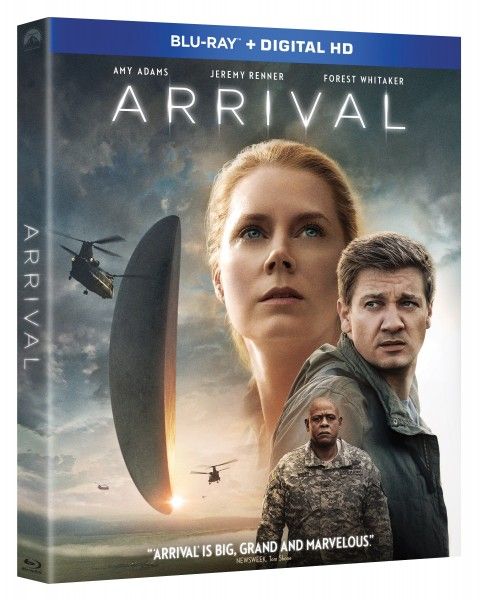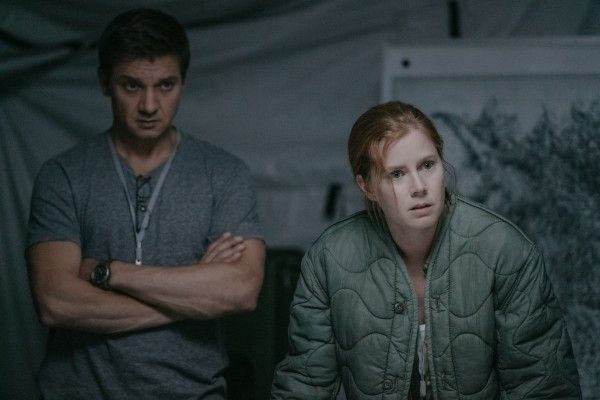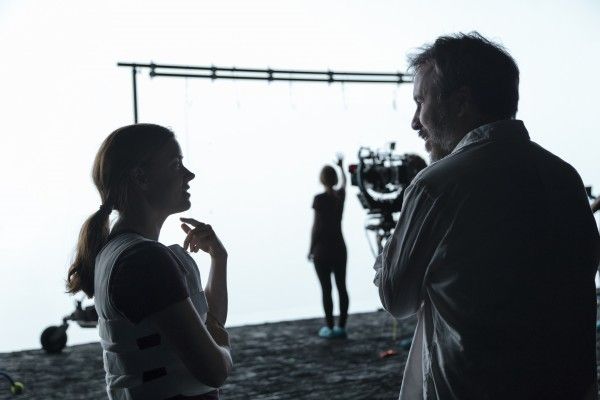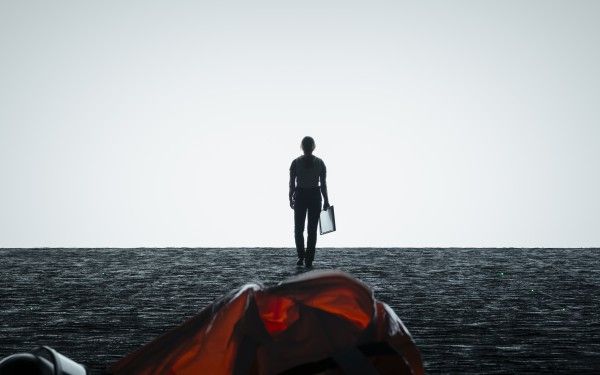When writing in the science-fiction genre, the possibilities are at times equally endless and limiting. Science-fiction means you’re not bound by realistic constraints, but the genre has been so fruitful that a variety of different kinds of sci-fi stories have already been told; truly breaking new ground is difficult. What makes Arrival unique is that it approaches the sci-fi genre from an angle of intelligence and emotion. The film revels in the scientific process and Louise Banks—a linguist—and Ian Donnelly—a theoretical physicist—are the film’s heroes when extra-terrestrials come calling, not a team of superhumans or bulky military men. The film is also grounded in this emphatically human story filled with emotion, providing an anchor of universality for the audience.
With Arrival hitting Blu-ray and DVD on February 14th, and in celebration of the film’s eight Oscar nominations including Best Picture, Best Director, and Best Adapted Screenplay, I recently got the chance to speak with Academy Award-nominated writer Eric Heisserer about the film. He revealed how Christopher Nolan’s own sci-fi tale Interstellar forced them to change the original ending of Arrival, and discussed how Denis Villeneuve provided a refreshingly close director/screenwriter collaboration. We also discussed how Heisserer approached writing the film’s big reveal and grounding the movie in intelligent sci-fi, and since he co-wrote the upcoming Van Helsing movie, he teased a bit about what fans can expect from that monster pic. Check out the full interview below.
Congratulations on the Oscar nomination. It’s extremely well deserved. I saw this movie back at TIFF and have been thinking about it ever since.
ERIC HEISSERER: Oh nice.
I know that filmmaking is an evolving process, so I was curious how close is the finished film to your initial script? Were there any major changes made?
HEISSERER: I would say the only real significant change is the gift that the heptapods leave us with. In earlier versions they were leaving sort of the blueprints to an interstellar ship, like an ark of sorts. And then Chris Nolan’s Interstellar came out and all of us got together and said, ‘Well this doesn’t quite work now’ (laughs). So we focused more on what we had there in front of us, which was the power of their language.
That’s interesting. So what was their purpose for coming to earth then in that initial script? To give us the mode of transportation to travel to help them?
HEISSERER: Yes, it was always that in three millennia we would end up being in a place to help them, and in order to have that happen we needed to start colonizing. We needed to start getting off Earth.
Oh wow. That’s really interesting. Well I’m always interested in the screenwriter/director relationship, and Denis is one of the more exciting filmmakers working today. What were your initial conversations with him like? If I’m not mistaken you wrote this before he signed on to direct right?
HEISSERER: Yes, it was actually several years before he signed on to direct. And that was just a long process of pining and waiting for him, because he was off shooting Prisoners when we had the script ready. He’d been very interested in the short story but didn’t know how it’d become a film, so we wanted to at least give him the chance to read the script and see if he was drawn to it. Honestly, so many of the times that I meet a director once they come onboard or they show interest in a script it feels a lot like a hostage tradeoff on a bridge at midnight, where I show up and the director’s like, ‘That’s a nice kid. I’m gonna take him away now. You’re not gonna see him again, and maybe I’ll remember your name at the premiere.’ That’s typically how the relationship goes for me (laughs). The meeting’s they’d be half an hour and I’d end up getting the bill. But here I sat down for coffee with Denis and we talked for maybe 90 minutes about science and philosophy and politics and about the story, about Louise as a character, and then at the end of that he said, ‘This was lovely. Let’s do this again next week.’ And I was blown away. I didn’t know what to say because this is been a very new experience for me, how Denis has his relationship with his writers. We did this for about two months and then finally I heard officially that he’d signed on, and he called me directly a short time after and he said, ‘Okay Eric now we are married.’ (laughs). And that kind of tells you everything about how he works with his writer. That sums it up.
That’s great. Well another thing I love about this film is it’s an intelligent sci-fi story that revels in the scientific process. It’s not act first, ask questions later. Was that important for you from the get-go?
HEISSERER: Absolutely. In fact at a time that was the most important thing to me.
It really makes the film stand out from a lot of other large-scale sci-fi movies. In your meetings did you ever have any pushback from anyone who wanted to pull that back a bit or add more explosions?
HEISSERER: No, I’m grateful that I—you know it had taken me two years to find producers that were attracted to the project in the first place, and the wait paid off. I found that the producers at 21 Laps absolutely wanted to make the same movie I did, and there was never any disagreement on that. They are some of the sharpest minds that I’ve had the pleasure of working with. It was really all about if there was a decision that we’d seen oftentimes in a science-fiction movie in the past, we thought, ‘Well OK we’ll do it the other way.’ (laughs)
Another thing I love about this movie is that the “reveal” isn’t explained in a piece of dry expository dialogue. It’s told through vignettes, emotion, and visuals. What was that like to write?
HEISSERER: It was important to me, and it was honestly the first thing that I wrote when I sat down. I wrote the first five pages and the last five pages, and that was honestly shortly after re-reading the story, so I had a lot of those emotions swirling around inside me. And I would say maybe 99% of what’s in the final film was what I wrote in that first draft, those two scenes.
That’s great. Well you also co-wrote the Van Helsing movie with Jon Spaihts. I’m really curious about this Universal writers room. Did you guys all come together and pitch story ideas then break off from there, or did you come in as the writer of Van Helsing from the get-go?
HEISSERER: We all came in without putting a flag down on any of those certain monsters or films, just talking about how we saw the world working and what we wanted to explore. Sometimes we’d talk about themes, and Jon and I just found ourselves kind of on the same page in terms of what we wanted to see Van Helsing explore. It was a natural team-up, I think. It was just a conclusion that we all reached around the table that he and I would work on that together.
I know you probably can’t say much about it, but what would you say sets this version of Van Helsing apart from prior incarnations?
HEISSERER: Well I guess the biggest thing that’s already been said is it’s contemporary; it’s a modern-day reimagining.
Was there kind of a central thematic driving force that you guys wanted to get across with this Van Helsing?
HEISSERER: I can talk about my emotional state of what I’ve been passionate about or sometimes frustrated by are the number of films where we find an extraordinary character with superhuman abilities that becomes a hero to solve a problem that a normal person cannot solve. And I was eager to try and buck that trend and showcase someone who had no extraordinary powers, just resourcefulness and will and kind of a stubbornness who’s able to tackle some of these bigger problems. Because I don’t like the idea that we’re infusing our public and our pop culture with the idea that only super people can solve the world’s problems. I like the idea of the everyday hero stepping up to the plate and getting things fixed.
For sure, it certainly feels like the blockbuster market is oversaturated with superhuman stories. Would you describe the film as horror? Action-adventure? I know you have a background writing horror films.
HEISSERER: I don’t know what it’s going to look like at the end of the process, so I’m gonna withhold on commenting on really where it lands. I can say that my intent stepping in was to make it as scary as possible, partly because I know how to do that, and also because when you’re the only human surrounded by a bunch of supernatural creatures, that’s gotta be absolutely unnerving.
Obviously with the well-deserved Oscar nomination I imagine you’re pretty in-demand now. Are you one of these writers that has a drawer full of scripts that you’re dying to get made, or do you take it one at a time?
HEISSERER: I am, for better or worse, always looking forward to some new project even though I do have a giant pile of scripts that I’ve abandoned in various stages behind me. Now and then someone will point out, ‘Hey that thing you did five years ago is actually really good, you should get back to it,’ in which case I’ll have some second thoughts about that. But yeah, I’m always looking to create new stuff. I think I’m on script number 61 now.






